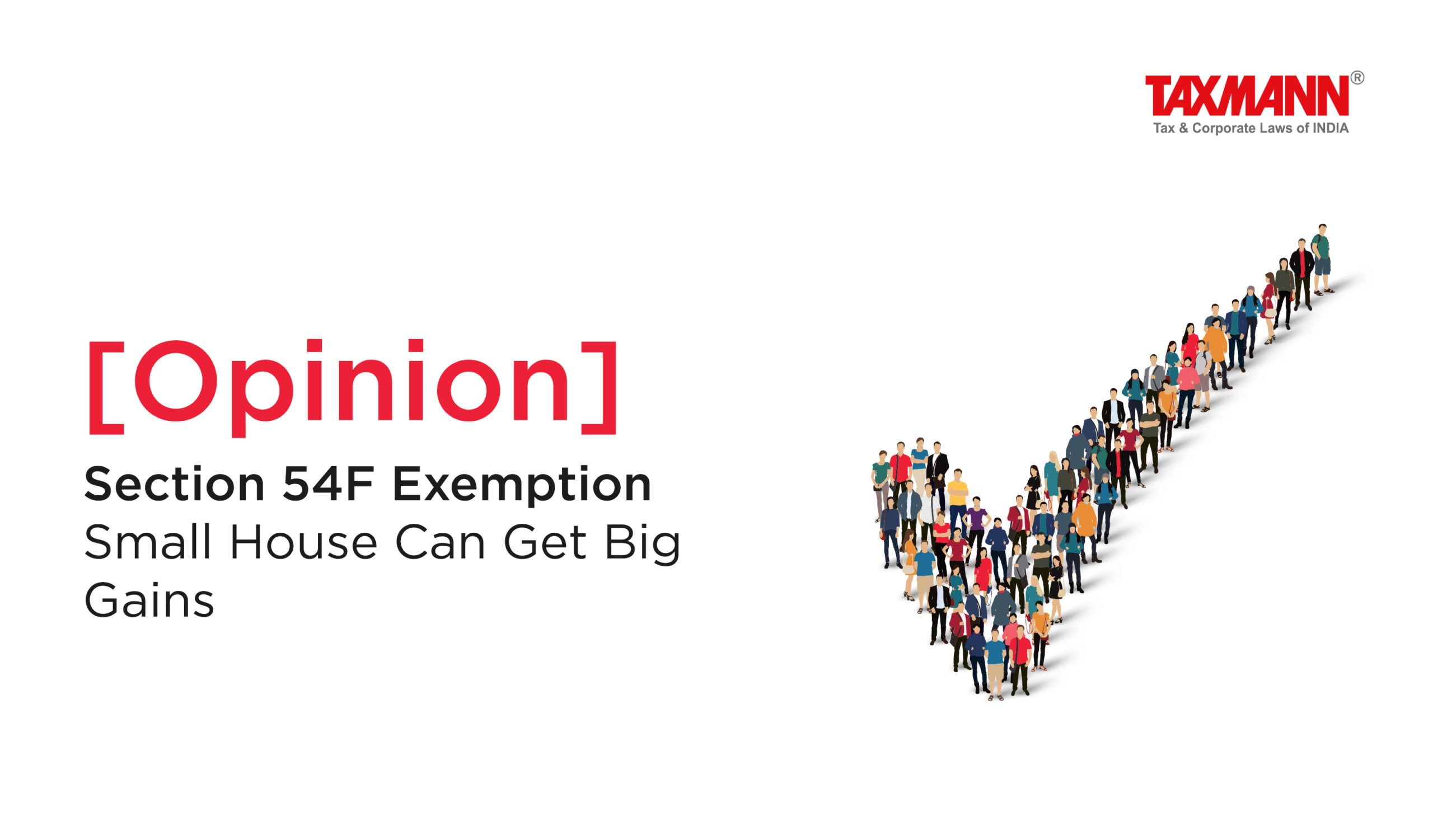[Opinion] Section 54F Exemption | Small House Can Get Big Gains
- Blog|News|Income Tax|
- 3 Min Read
- By Taxmann
- |
- Last Updated on 6 September, 2023

Meenakshi Subramaniam – [2023] 153 taxmann.com 738 (Article)
Income tax officer:
“I can’t give Section 54F exemption for your house, as it has no living room, bedroom or even kitchen.
The assessee said:
“But, it has a door, sir. A living room, bedroom or kitchen is not essential. But, a door is a must. Or else, strangers, thieves and animals would troop in. As I have the most required thing for a residence, Section 54 exemption must be given.”
What happens when a house is considered small and not granted Section 54F exemption?
The Delhi Tribunal, in a recent judgement, [2023] 153 taxmann.com 554 – ITAT rightly ruled that the assessee should get Section 54F benefit.
[2023] 153 taxmann.com 554 – ITAT
Girish Mohan
v.
ACIT
The assessee got an order from the Ld CIT(A), wherein it was observed:
a. The assessee has constructed a very small residential house and land size was very big. The cost of construction is very small when compare to the price of land.
b. Assessee failed to prove that the small dwelling unit was intended to be used for residential purpose.
c. Considering the status of assessee (by seeing his returned income) it is not acceptable that assessee was intending to use the dwelling unit as his residential house.
d. It has to be assumed from the marginal heading of section 54F that the intention of legislature was to extend the benefit of exemption u/s 54 only when the property purchased by the appellant was intended to be used as residential house.
e. The exemption claimed is only restricted to the land beneath under constructed portion and no deduction for vacant portion of land.
The CIT(A) allowed the deduction of 54F but restricted the deduction to constructed portion.
An appeal was filed by the assessee against the order of the ld CIT(A)-1, Gurgaon, dated 23.09.2019 for AY 2016-17, in which one ground of appeal was:
That the Ld CIT (A) has erred on facts and in law in upholding the disallowance of deduction claimed u/s. 54F.
The assessee raised ground that earlier, the AO has alleged that assessee is merely possessing a piece of land without any construction thereon and hence not entitled for deduction of 54F.
The assessee pointed out to AO about the incurring of expenses on construction of house, further assessee has also pointed out the source of those expenses. However the AO very conveniently ignored the submissions of the assessee.
The submissions of the assessee on section 54F exemption, regarding the CIT’s order are as under
a. The observation of the CIT(A) that the legislature wanted that the exemption should only be allowed to an assessee who intended to use the new residential house for residence purpose is legally incorrect in as much no such requirement is mentioned in section 54F The marginal notes of section 54F and provisions of section 54F nowhere suggest that investment should be in such residential house where assessee intends to reside. This issue has been examined by the various benches of the ITAT, in the following decisions:-
(i) Mahavir Parsad Gupta v. Jt. CIT [2006] 5 SOT 353 (Delhi)
(ii) ACIT v. Omprakash Goyal [IT Appeal No. 647 (Jp) of 2011, dated 2-2-2012]
(iii) DCIT v. Kanwal Mohan Singh Sehgal [IT Appeal No. 500 (D) of 2019, dated 25-8-2022]
The next observation of the CIT(A) that the size of the constructed portion is very small and the exemptions benefits cannot be extended to the land appurtenant is also not tenable in law. Reliance can be placed on the following judgments
(i) Kanwal Mohan Singh Sehgal (supra)
(ii) Addl. CIT v. Narendra Mohan Uniyali [2009] 34 SOT 152 (Delhi)
That the new investment was in fact a residential house has been proved by assessee with following documents:
Site plan approved by Rajasthan State Govt clearly mentioned character of land is residential
A CLU (Change of Land) granted in respect of land purchased by assessee from the previous owner Omprakash Chandel
Valuation report
Water and electricity bills
Click Here To Read The Full Article
Disclaimer: The content/information published on the website is only for general information of the user and shall not be construed as legal advice. While the Taxmann has exercised reasonable efforts to ensure the veracity of information/content published, Taxmann shall be under no liability in any manner whatsoever for incorrect information, if any.

Taxmann Publications has a dedicated in-house Research & Editorial Team. This team consists of a team of Chartered Accountants, Company Secretaries, and Lawyers. This team works under the guidance and supervision of editor-in-chief Mr Rakesh Bhargava.
The Research and Editorial Team is responsible for developing reliable and accurate content for the readers. The team follows the six-sigma approach to achieve the benchmark of zero error in its publications and research platforms. The team ensures that the following publication guidelines are thoroughly followed while developing the content:
- The statutory material is obtained only from the authorized and reliable sources
- All the latest developments in the judicial and legislative fields are covered
- Prepare the analytical write-ups on current, controversial, and important issues to help the readers to understand the concept and its implications
- Every content published by Taxmann is complete, accurate and lucid
- All evidence-based statements are supported with proper reference to Section, Circular No., Notification No. or citations
- The golden rules of grammar, style and consistency are thoroughly followed
- Font and size that’s easy to read and remain consistent across all imprint and digital publications are applied



 CA | CS | CMA
CA | CS | CMA
